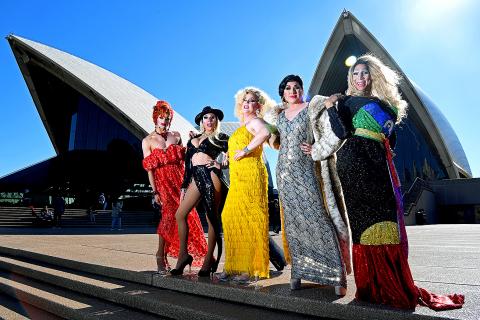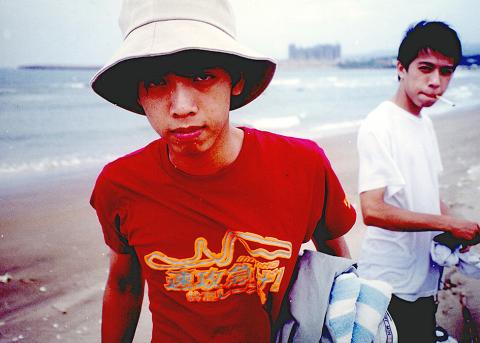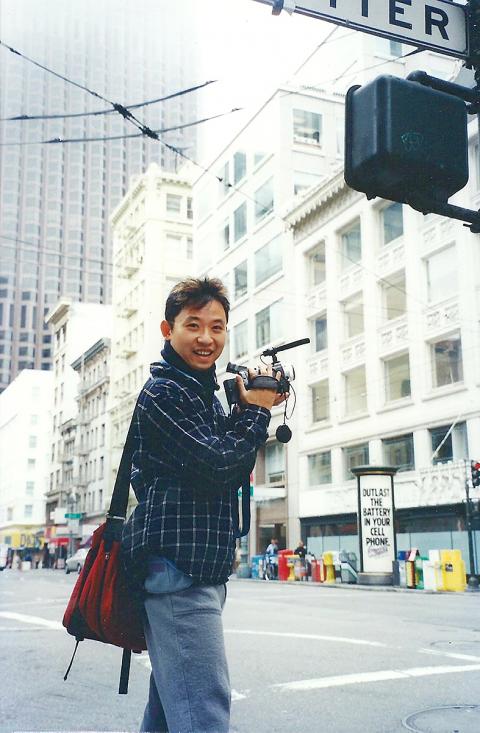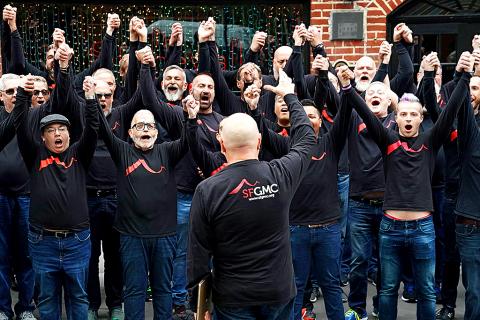Twenty-three years ago, Hsu Yu-sheng (許佑生) and his American partner Gary Harriman became the first gay couple to hold a public, albeit not legally recognized, wedding in Taiwan.
The event was captured on film by the late director Mickey Chen (陳俊志), and became the subject of his 1997 documentary Not Simply a Wedding Banquet (不只是喜宴). This was the first in a series of unprecedented, intimate portraits by Chen that brought Taiwan’s gay community to the big screen.
LGBT rights and representation have come a long way since then, not least with the legislation of same-sex marriage in May. Chen, who had increasingly dedicated his time to activism, did not live to see that historic moment, passing away late last year at the age of 51.

Photo: EPA-EFE
He will be honored at this year’s Taiwan International Queer Film Festival in Taipei and Kaohsiung through a retrospective of six works, including a previously unreleased documentary about HIV-positive people in Taiwan.
CELEBRATORY ATMOSPHERE
Chen’s commemoration will strike one of the more somber notes in a festival that’s otherwise celebrating an exhilarating year in high drag and fetish leather.

Photo courtesy of Taipei Film Festival
Some of those celebrations will be literal. Tomorrow’s opening film, A Very Sordid Wedding, sets the tone with a campy clash of small-town family values and homophobia in the US, revisiting beloved characters from director Del Shores’ 2000 cult comedy Sordid Lives.
Riot takes the party to the streets with a dramatized account of the 1978 protest that became the first Sydney Gay and Lesbian Mardi Gras, now one of the largest pride parades in the world. On Sunday, Sydney Mardi Gras co-chair Giovanni Compolo-Arcidiaco and leading local LGBT rights activist Jennifer Lu (呂欣潔) will be panelists in a discussion about the role of glittery LGBT carnivals in a serious social movement.
Feel-good stories like these abound, even if some take a tragicomic approach. They acknowledge progress even while demonstrating how essential a good sense of humor still is to get through life as an LGBT minority.

Photo courtesy of Taipei Film Festival
The mood is captured in this year’s theme, “Dou Zhen (逗陣) Together” — a play on the Chinese words for teasing and struggling — as well as films like Tucked, a British odd-couple drama depicting the friendship and varied approaches to life of an aging queen and rising young starlet in the drag scene.
A-LISTERS
Some A-list names appear on the marquee this year. Canadian actress Ellen Page, who came out publicly in 2014, stars in My Days of Mercy, which simultaneously tackles the death penalty debate. French musician and actress Vanessa Paradis carries French-Mexican film Knife + Heart, one of the more experimental works on offer, which delves into a murder mystery in the porn industry.

Photo: Reuters
But some stories, particularly in the documentary section, also call attention to the inequalities remaining for causes that are less widely understood. Man Made goes behind the scenes of the world’s only bodybuilding competition exclusively for trans men in the US, while No Gender introduces audiences to intersex manga artist Sho Arai.
And there is welcome representation of LGBT experiences from outside of East Asia and the West. The Middle East is represented by Israeli film Red Cow, starring one of the region’s few out actresses Moran Rosenblatt, and Iranian short films Manicure and Parking. Southeast Asia contributes Vietnam’s Song Lang, with two pretty-boy leads portraying a debt collector and folk opera performer who form a connection, and the Philippines’ coming-of-age lesbian love story Billie and Emma.
The heart of the festival, however, remains in Taiwan. If Chen’s retrospective pays witness to a decade of LGBT culture up to the early 2000s, then the task of carrying that vision forward is left to the local short film selection.
Across 11 films made in the last two years, a younger generation of directors reflect on modern-day self and national identity through stories that range from BDSM in a military camp, to 1950s housewives who live double lives at night.

Eric Finkelstein is a world record junkie. The American’s Guinness World Records include the largest flag mosaic made from table tennis balls, the longest table tennis serve and eating at the most Michelin-starred restaurants in 24 hours in New York. Many would probably share the opinion of Finkelstein’s sister when talking about his records: “You’re a lunatic.” But that’s not stopping him from his next big feat, and this time he is teaming up with his wife, Taiwanese native Jackie Cheng (鄭佳祺): visit and purchase a

April 7 to April 13 After spending over two years with the Republic of China (ROC) Army, A-Mei (阿美) boarded a ship in April 1947 bound for Taiwan. But instead of walking on board with his comrades, his roughly 5-tonne body was lifted using a cargo net. He wasn’t the only elephant; A-Lan (阿蘭) and A-Pei (阿沛) were also on board. The trio had been through hell since they’d been captured by the Japanese Army in Myanmar to transport supplies during World War II. The pachyderms were seized by the ROC New 1st Army’s 30th Division in January 1945, serving

The People’s Republic of China (PRC) last week offered us a glimpse of the violence it plans against Taiwan, with two days of blockade drills conducted around the nation and live-fire exercises not far away in the East China Sea. The PRC said it had practiced hitting “simulated targets of key ports and energy facilities.” Taiwan confirmed on Thursday that PRC Coast Guard ships were directed by the its Eastern Theater Command, meaning that they are assumed to be military assets in a confrontation. Because of this, the number of assets available to the PRC navy is far, far bigger

The 1990s were a turbulent time for the Chinese Nationalist Party’s (KMT) patronage factions. For a look at how they formed, check out the March 2 “Deep Dives.” In the boom years of the 1980s and 1990s the factions amassed fortunes from corruption, access to the levers of local government and prime access to property. They also moved into industries like construction and the gravel business, devastating river ecosystems while the governments they controlled looked the other way. By this period, the factions had largely carved out geographical feifdoms in the local jurisdictions the national KMT restrained them to. For example,